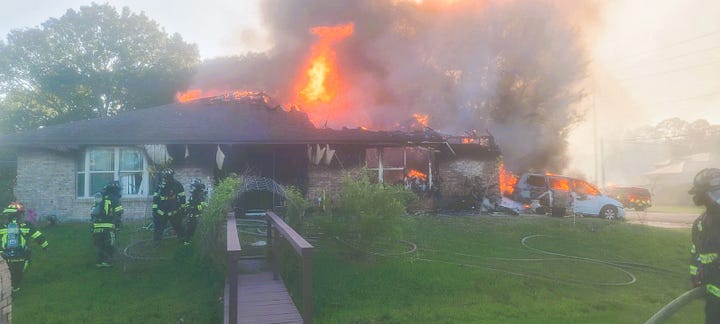Palm Bay Lithium-Ion Battery Fire Sparks Safety Concerns
How to Protect Your Home from Lithium-Ion Battery Hazards
Palm Bay, FL — On November 5, 2024, several Palm Bay Fire Rescue stations responded to a significant residential fire in the Sleepy Hollow neighborhood in the city's southeast section. Upon arrival, firefighters encountered heavy fire and smoke, with approximately 25% of the garage and adjacent living area involved. The challenging fire conditions, coupled with extremely long hose lays for water supply due to the distance from the nearest hydrant, made this incident difficult from the outset. The situation was further complicated by the presence of several large lithium-ion batteries and numerous smaller ones stored in the garage, which intensified the blaze. The unique hazards presented by these materials, such as the risk of explosions or toxic fumes, made operations on the fireground particularly challenging. Firefighters prioritized safety and successfully extinguished the fire without any reported injuries to residents or animals, including several goats on the property that were unharmed. Due to the risk of reignition from the batteries, crews maintained a continuous watch on the scene. The cause of the fire is currently under investigation.


This incident underscores the potential hazards associated with storing lithium-ion batteries in residential settings. These batteries are commonly found in devices like e-bikes, smartphones, and power tools. They can pose significant fire risks due to their high energy density and frequent charging requirements, especially if not handled properly. In Florida, there has been a growing concern over fires linked to lithium-ion batteries. For instance, in January 2024, an e-bike battery ignited a house fire in Brevard County.
Understanding Lithium-Ion Battery Hazards
Lithium-ion batteries are widely used due to their efficiency and energy density compared to other types of batteries like nickel-cadmium or lead-acid, which are bulkier and less efficient. However, they can become hazardous under certain conditions:
Overcharging or Overheating: Excessive charging or exposure to high temperatures can lead to thermal runaway, causing fires or explosions.
Physical Damage: Dropping, crushing, or puncturing batteries can compromise their integrity, increasing the risk of malfunction.
Improper Storage: Storing batteries in humid or excessively hot environments can degrade their safety and performance.
Safety Guidelines for Residents
To mitigate risks associated with lithium-ion batteries, residents should follow these safety practices, which are based on best industry standards and safety guidelines:
Use Manufacturer-Approved Chargers: Always charge batteries with the charger provided by the manufacturer to ensure compatibility and safety.
Avoid Overcharging: Do not leave batteries charging unattended or overnight to prevent overheating.
Store Properly: Keep batteries in a cool, dry place away from flammable materials.
Inspect Regularly: Check batteries for signs of damage, such as swelling or leakage, and discontinue use if any issues are found.
Dispose Safely: Do not throw lithium-ion batteries in the trash. Instead, take them to designated recycling centers or hazardous waste facilities.
Local Disposal Resources
Proper disposal of lithium-ion batteries is crucial due to their potential environmental hazards, such as contamination of soil and water, and fire risks. In Palm Bay, Republic Services advises against placing lithium-ion batteries in regular trash or curbside recycling bins, as they can cause fires or explosions if improperly handled. It is crucial that residents follow these guidelines to prevent dangerous fires.
Recycling Mail-Back Kits by Republic Services: Republic Services offers Recycling Mail-Back Kits for safe disposal. These kits allow you to package used batteries and ship them for responsible recycling.
Battery Recycling at Local Retailers: Local retailers such as The Home Depot at 1140 Malabar Rd SE in Palm Bay participate in battery recycling programs through the Call2Recycle program and accept rechargeable batteries.
Brevard County Household Hazardous Waste Collection Centers:
3600 South Street, Titusville (Monday–Saturday 8:00 am – 4:00 pm)
2250 Adamson Road, Cocoa (Monday–Saturday 8:00 am – 4:00 pm)
3379 Sarno Road, Melbourne (Monday–Saturday 8:00 am – 4:00 pm)
For more information or to obtain a Recycling Mail-Back Kit, contact Republic Services directly. Alternatively, you can visit the Brevard County Solid Waste Management Department's Recyclopedia for additional disposal options.
Conclusion
The recent fire in Palm Bay serves as a critical reminder of the potential dangers posed by improper storage and handling of lithium-ion batteries. By following recommended safety practices, residents can protect their homes and loved ones from similar incidents. Take a moment today to review your battery storage practices and make any necessary changes to ensure safety.
Stay Safe: Share and Spread Awareness
Awareness and proactive measures are key to mitigating fire risks associated with lithium-ion batteries. Consider sharing this information with neighbors and friends to help promote a safer community. If you have concerns about the safety of lithium-ion batteries in your home, reach out to Palm Bay Fire Rescue for further advice or assistance.
For more local safety updates, visit The Palm Bayer—where the news is free, like water should be.


